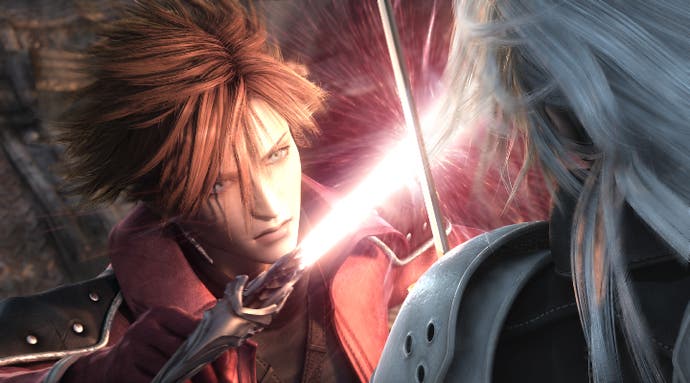Final Fantasy VII: Crisis Core
Cloud's silver lining?
Overlaid on the core battle system is the Digital Mind Wave (DMW) system, a kind of fruit-machine ticker that constantly reels in the top left of the screen. You have no control over the DMW. When three faces match on the reels (a bit like matching three cherries on a fruit machine) a short cut-scenes triggers and Zack will execute a more powerful special move or summon based on which character portraits matched. These (skippable) mini-cut-scenes are very impressive, echoing the exuberance of the original's summon and limit break animations.
As well as character portraits, each reel also displays a number. Match two numbers and you'll level up one of your equipped materia. Match three numbers and you'll level up Zack - the only way to increase his core stats. It's a brave move that, initially at least, is quite off-putting. While the chances of matching three numbers and leveling up Zack increase as you play via a hidden exp system, even the illusion of random game design is a misstep leading players to believe their progress is in the hands of fate rather than their own.
That said, after a few hours you settle into a traditional play arc, Zack levelling and augmenting his abilities with pleasing regularity. The missions you carry out as you drive the story along are short and sweet and, while the lack of a map system irks, environments are so small, bland and funnelled that it doesn't take long to find your destination or target through chance.
To bolster the game's breadth, at any save point you can take on additional freelance missions. These bite-sized assignments usually task you with defeating a powerful boss or finding a particular piece of treasure. There are scores of them, each one taking from two to ten minutes to complete - perfect for mobile play. While the main game is short, if you choose to tackle this extra curricular content the game's depths offer much ground to mine and discover.

It's a game that's left us torn. On the one hand, the youngster in us finds his heart warm when the familiar music starts up, when running errands in the Midgar slums with Aerith in tow or while watching Genesis, Angeal and Sephiroth engage in a filmic fight atop one of the huge gun emplacements. Indeed the game is at its absolute best when it's performing raw fan service. But, peel back the Final Fantasy VII clothing and what lies beneath is, after prolonged scrutiny and, despite the meticulous presentation, tiresome.
While there are successes in the battle system, were this a game with any other branding it would be soon forgotten. The impenetrable story makes it a no-go for younger gamers who might be more willing to forgive its adolescent excesses. But for the twenty-six, twenty-eight, thirty-year-olds who it's aimed at, the game has little to offer beyond polished sentimentality. In six months' time Crisis Core will be remembered not for being a classic that changed the landscape, demographic and influences of videogames the world over like its forebear once did. Rather, it will be remembered for being a well-produced PSP curio, the best Final Fantasy VII spin-off for certain, but the best of a rotten bunch. Anyone who tells you otherwise is fooling themselves. And while there are those who want to be fooled - who need to be fooled to keep the dream alive - the rest of us would be better off burying these heroes if we're to treasure them.








